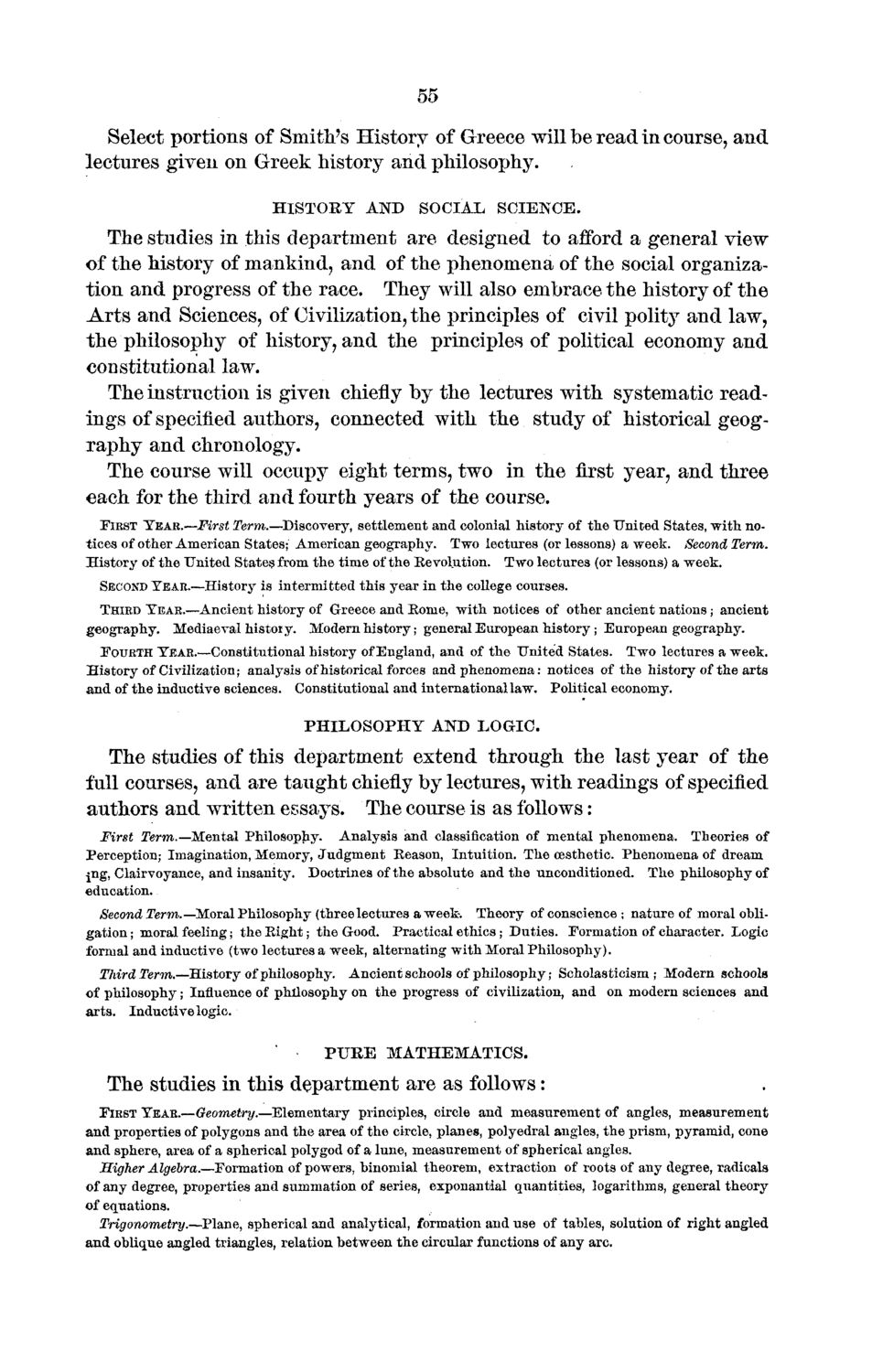| |
| |
Caption: Board of Trustees Minutes - 1872
This is a reduced-resolution page image for fast online browsing.

EXTRACTED TEXT FROM PAGE:
55 Select portions of Smith's History of Greece will be read in course, and lectures given on Greek history and philosophy. HISTORY AND SOCIAL SCIENCE. The studies in this department are designed to afford a general view of the history of mankind, and of the phenomena of the social organization and progress of the race. They will also embrace the history of the Arts and Sciences, of Civilization, the principles of civil polity and law, the philosophy of history, and the principles of political economy and constitutional law. The instruction is given chiefly by the lectures with systematic readings of specified authors, connected with the study of historical geography and chronology. The course will occupy eight terms, two in the first year, and three each for the third and fourth years of the course. FIRST TEAR.—First Term.—Discovery, settlement and colonial history of the United States, with notices of other American States; American geography. Two lectures (or lessons) a week. Second Term. History of the United States from the time of the Revolution. Two lectures (or lessons) a week. SECOND TEAR.—History is intermitted this year in the college courses. THIRD TEAR.—Ancient history of Greece and Rome, with notices of other ancient nations ,• ancient geography. Mediaeval history. Modern history; general European history ; European geography. FOURTH TEAR.—Constitutional history of England, and of the United States. Two lectures a week. History of Civilization; analysis of historical forces and phenomena: notices of the history of the arts and of the inductive sciences. Constitutional and international law. Political economy. PHILOSOPHY AND LOGIC. The studies of this department extend through the last year of the full courses, and are taught chiefly by lectures, with readings of specified authors and written essays. The course is as follows: First Term.—Mental Philosophy. Analysis and classification of mental phenomena. Theories of Perception; Imagination, Memory, Judgment Reason, Intuition. The cesthetic. Phenomena of dream jng, Clairvoyance, and insanity. Doctrines of the absolute and the unconditioned. The philosophy of education. Second Term.—Moral Philosophy (three lectures a week. Theory of conscience ; nature of moral obligation ; moral feeling; the Right; the Good. Practical ethics; Duties. Formation of character. Logic formal and inductive (two lectures a week, alternating with Moral Philosophy). Third Term.—History of philosophy. Ancient schools of philosophy; Scholasticism; Modern schools of philosophy; Influence of philosophy on the progress of civilization, and on modern sciences and arts. Inductive logic. P U R E MATHEMATICS. The studies in this department are as follows: FIRST TEAR.—Geometry.—Elementary principles, circle and measurement of angles, measurement and properties of polygons and the area of the circle, planes, polyedral angles, the prism, pyramid, cone and sphere, area of a spherical polygod of a lune, measurement of spherical angles. Higher Algebra.—Formation of powers, binomial theorem, extraction of roots of any degree, radicals of any degree, properties and summation of series, exponantial quantities, logarithms, general theory of equations. Trigonometry.—Plane, spherical and analytical, formation and use of tables, solution of right angled and oblique angled triangles, relation between the circular functions of any arc.
| |